- Date2023-10-10 18:45
- View5,310
The Korea Environment Institute (KEI) hosted the KEI-Bangladesh Green Growth Policy Dialogue on September 19 and October 5 at its headquarters in the Sejong Research Complex. The participants included high-level public officials of Bangladesh and the representatives from the World Bank, Bangladesh Office. The event included a knowledge exchange on environmental education and circular economy, aimed at building long-term partnership between public institutions in Bangladesh and Korea.
Participants from Bangladesh in the event held on September 19 included Mr. Suleman Khan, Secretary of Secondary and Higher Education Division (SHED) under the Ministry of Education of Bangladesh; Ms. Nasreen Afroz, Executive Chairman (Secretary), National Skills Development Authority (NSDA); Dr. A. S. M. Maksud Kamal, Pro-Vice Chancellor, University of Dhaka; Mokhlesur Rahman, Senior Operations Officer, World Bank; Yoko Nagashima, Senior Education Specialist, World Bank; and 17 representatives from various organizations, including the Ministry of Primary and Mass Education.
The event began with a meeting with KEI President Chang Hoon Lee. During the meeting, Mr. Sulemen Khan requested that KEI make additional efforts to provide environmental education programs to developing countries, particularly in the form of E-learning. President Lee assured him of KEI’s commitment to this cause, explaining the organization’s existing plans in this regard.
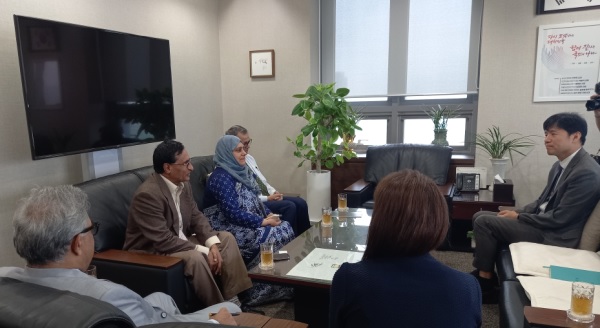
Bangladeshi Delegation in a Meeting with KEI President Chang Hoon Lee.
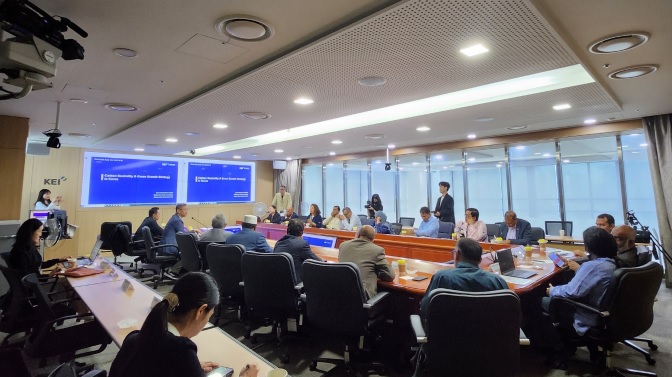
The seminar venue: KEI Headquarters, Sejong Research Complex.
During the event, Dr. Dong Won Shin, Director of the Division for Climate and Energy, delivered a presentation on carbon neutrality and green growth strategies in Korea. Dr. Shin outlined the various climate and carbon neutrality strategies that Korea has been implementing and introduced Korea’s upcoming plans to further advance its goals of achieving carbon neutrality and green growth.
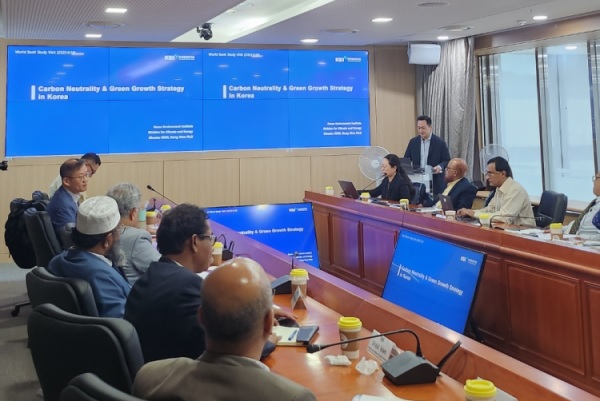
Dr. Dong Won Shin delivering a presentation on Carbon Neutrality and Green Growth Strategies in Korea.
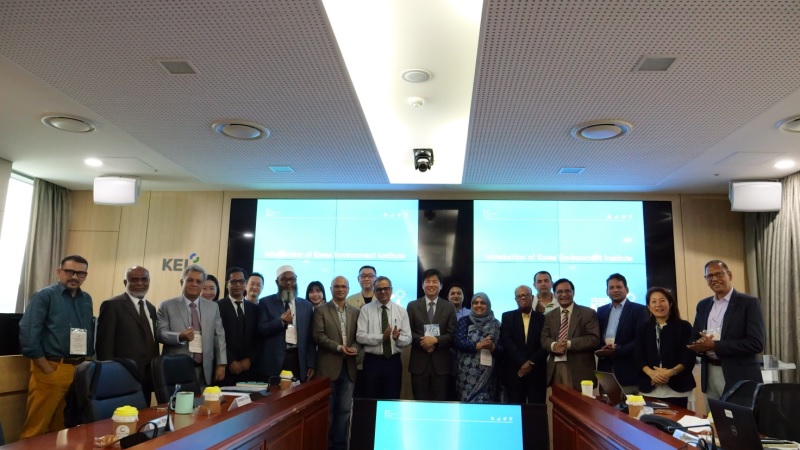
Group photo
Participants in the event held on October 5 from Bangladesh included Mr. Saber Hossain Chowdhury, Deputy Minister of the Ministry of Environment, Forest and Climate Change; Mr. Satyajit Karmaker, Secretary of the Ministry of Planning; Mr. Abdul Baki, Secretary of the Ministry of Planning; Ms. Eun Joo Yi, Senior Environmental Specialist of the World Bank; and seven other representatives.
From KEI, seven individuals participated in the event: President Chang Hoon Lee; Dr. Eulsaeng Cho, Director General of the Department of Planning and Strategy; Dr. Ikjae Kim, Chief Research Fellow of the Division for Integrated Water Management; Dr. Ji Hye Jo, Head of the Division for Resource Circulation; and three individuals from the Global Cooperation Team, including Dr. Sungjin Kim, Head; Jun Hyun Park, Senior Researcher; and Yejin Kim, Researcher.
During the meeting with KEI President Lee, the Bangladeshi representatives expressed their hopes that Korea would share its experiences and know-how related to circular economy policy development. President Lee assured them of support in this regard, emphasizing that the circular economy is a field of great interest to South Korean government and KEI.
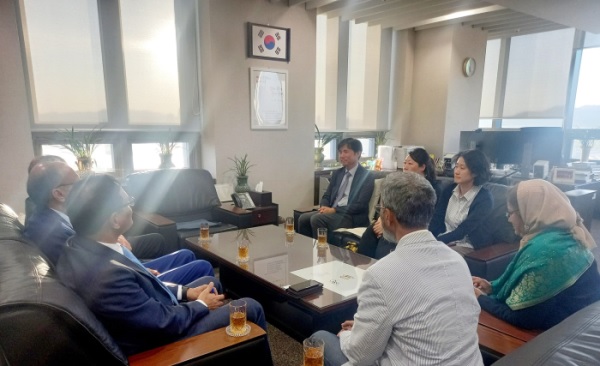
Bangladeshi Delegation in a Meeting with KEI President Chang Hoon Lee.
During the event, Dr. Ji Hye Jo delivered a presentation on accelerating the circular economy in South Korea. Dr. Jo outlined the current state of circular economy implementation in Korea and policy directions, and provided examples of KEI’s research work related to the circular economy.
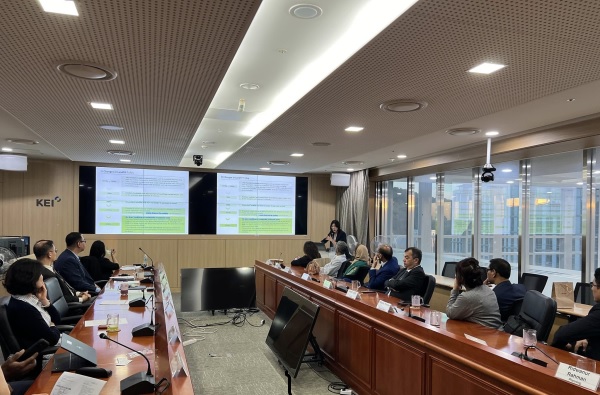
Dr. Ji Hye Jo delivering a presentation Accelerating Circular Economy in South Korea.
The participants pledged ongoing collaboration between the South Korean government and Bangladesh government, as well as between KEI and the World Bank, Bangladesh Office. They specifically committed to further developmental cooperation, which includes collaborative research, education and training, policy consultation to address challenges in the fields of climate change, air pollution, water pollution, and waste treatment that Bangladesh is currently confronting.
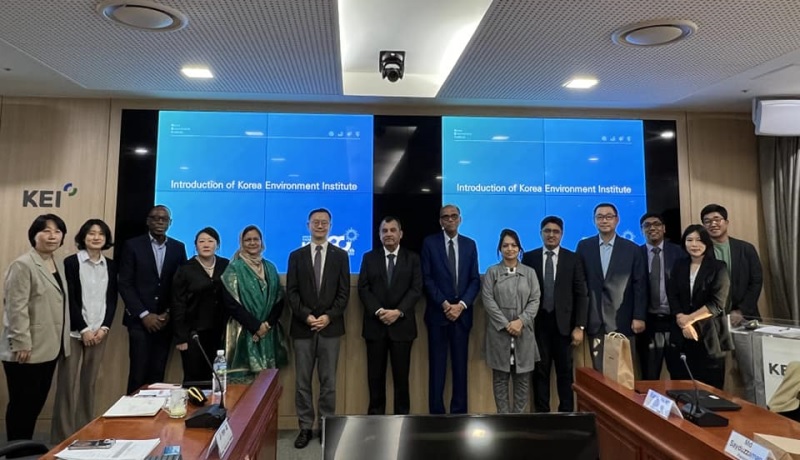
Group photo
- PrevKEI Attended Korea-Finland 50th Diplomatic Relations Anniversary Commemoration Seminar
- NextAdvancing Sustainable Development in the Mekong Region: The KEI-VASS-LASES-RAC Joint Conference
